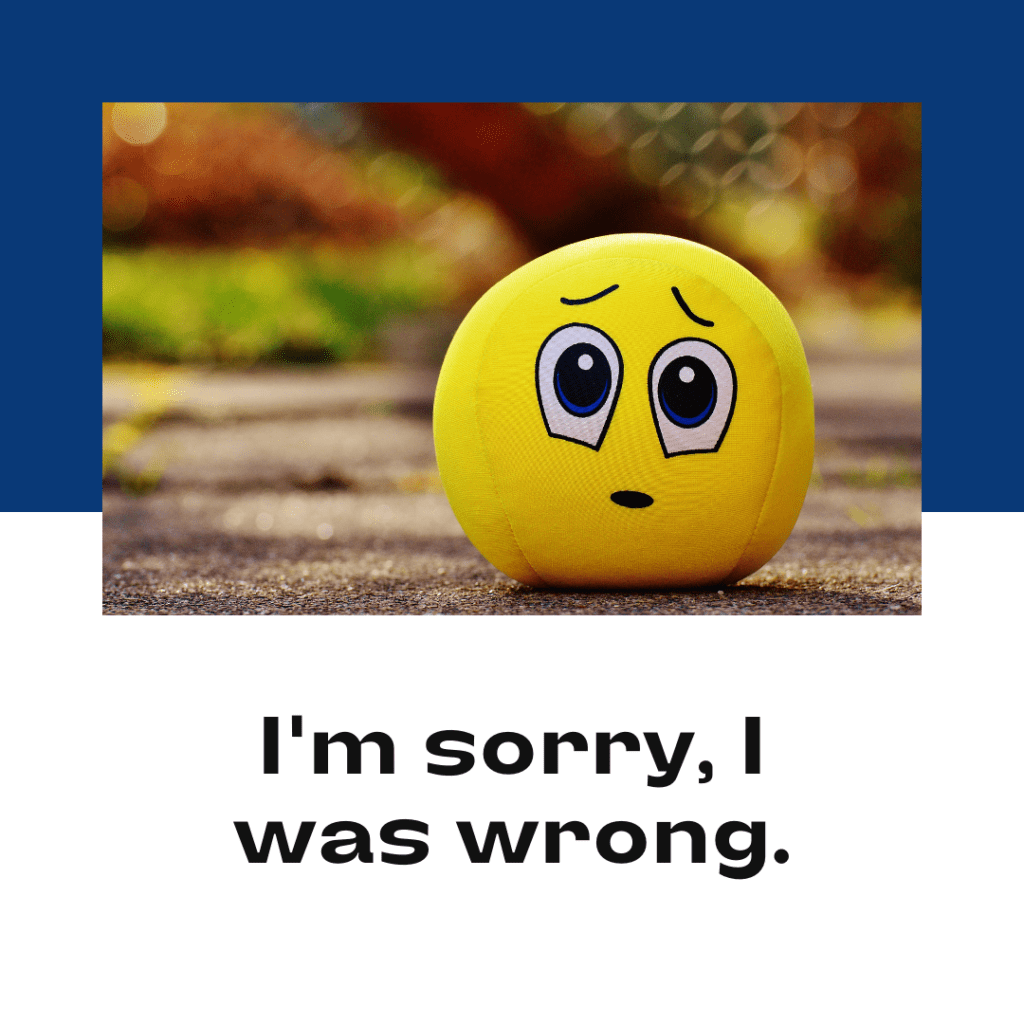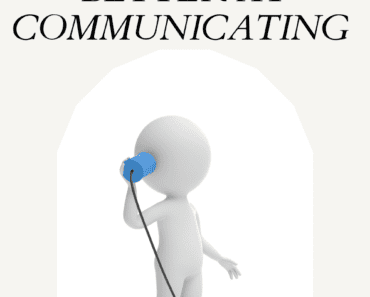In the quest for personal growth and professional success, one of the most potent yet often overlooked tools is the ability to admit when we are wrong. Despite our best intentions, we all occasionally find ourselves on the wrong side of an argument, the line of ethics, or the plan for our lives. This profound recognition, cloaked under the term ‘humility,’ has the power to shape not only how we interact with the world but also how we perceive ourselves within it.
Humility is the honest acknowledgment of our own limitations and fallibility, coupled with a gentle acceptance of our imperfections. Admitting we are wrong is the courageous act of owning up to our mistakes, even when it’s uncomfortable, signifying a commitment to integrity and self-improvement.
The Impact of Admitting You Are Wrong

At its core, the admission of error is a beacon of authenticity that can strengthen our most vital connections.
In the workplace, a leader who is willing to acknowledge a mistake not only garners respect but creates a culture of accountability.
In relationships, the art of admitting fault can defuse tension and build trust.
For our health, the psychological release from ‘needing to be right’ can reduce stress and promote mental wellness.
Other areas impacted include:
- Personal Growth and Development – When we embrace humility and admit our mistakes, we open ourselves up to learning and growth. We are able to reflect on our actions and make necessary changes, leading to a more fulfilling life.
- Conflict Resolution – Admitting mistakes allows for honest communication and can lead to the resolution of conflicts. By taking responsibility for our wrongdoings, we can promote understanding and empathy with others.
- Perfectionism – The pressure to always be right can stem from a fear of failure and perfectionism. Admitting mistakes can help us overcome these tendencies and lead to a more balanced and healthier mindset.
- Creativity and innovation – Embracing humility allows us to let go of the need to always be right and opens our minds to new ideas and perspectives. This can lead to more creative thinking and innovative solutions.
- Emotional Intelligence – Being able to admit mistakes requires a high level of emotional intelligence. It involves self-awareness, empathy, and the ability to regulate our emotions. By practicing humility and admitting our wrongdoings, we can improve these important skills.
Barriers To Admitting That You Are Wrong
While understanding the importance of admitting our mistakes is one thing, actually doing so is often hindered by a variety of psychological and social barriers.
Pride, for instance, can play a significant role; it’s tough to swallow our ego and confront our imperfections.
Fear is another major blockade—it whispers possibilities of judgment or diminished respect from peers, which can feel more threatening than making the mistake itself.
Social pressures and expectations to portray an image of unwavering competence also discourages admissions of fault, aligning vulnerability with weakness rather than strength.
Many of us find that our insecurities can create a defensive armor, instinctively deployed to protect our self-esteem at the moment, ironically at the expense of our personal growth and authenticity in the long run.
The Road to Recognition
The journey to recognizing our own wrongs begins with cultivating a mindful approach to self-reflection.
Recognizing When We Are Wrong
To identify when we’re at fault, it’s imperative to create a system of self-evaluation that encourages regular check-ins with our actions and decisions. We can start by asking ourselves a series of questions:
- Reflect on Motives: “What were my motives in this situation? Were they driven by self-interest or the greater good?”
- Consider Evidence: “Have I overlooked or dismissed evidence that contradicted my views or actions?”
- Empathy and Feedback: “What impact has my decision had on others? Have I sought out and listened to feedback?”
- Consistency Check: “Am I applying my principles consistently, or am I bending them to suit my current narrative?”
Moving Past Pride and Fear
Navigating beyond pride and fear requires us to embrace learning as a core value, one that acknowledges error as the foundation of growth.
Strategies for this include:
- Embrace Vulnerability: Recognize that admitting wrong is a courageous act, not a weakness.
- Redefine Success: Reorient your perception of success to value progress and learning over always being right.
- External Perspectives: Engage with diverse viewpoints and allow them to challenge and refine your understanding.
- Shared Humanity: Remember that perfection is unattainable and that all humans are fallible; errors are part of the shared human experience.
By establishing these reflective habits and redefining our attitudes toward mistake-making, we set forth on a more honest and rewarding path, both personally and within the wider context of our communities and professional spheres.
Steps to Embrace The Fact We Are Not Always Right
Embracing humility means acknowledging our limitations and recognizing that we are just one contributor in a vast expanse of knowledge and expertise. We can adopt a stance of humility by:
- Seeking Feedback: Regularly ask others for feedback, showing a true willingness to hear and learn from it, even when it is critical.
- Active Listening: When others are speaking, listen intently, giving space for their thoughts and opinions rather than pre-emptively formulating a response.
- Credit Others: Give credit where it is due and celebrate the accomplishments and contributions of others.
- Continual Learning: Accept that knowledge is boundless and make a lifelong commitment to learn and be open to new information.
- Mindfulness: Reflect on your actions and maintain awareness of your own cognitive biases and how they may skew your perception.
By consciously practicing these steps, we can foster a deeper sense of humility, leading us to admit when we are wrong and, in turn, encouraging personal growth and stronger, more respectful relationships.
Affirmations To Embrace Admitting Our Mistakes
Adopting the habit of daily affirmations can play a critical role in our ability to admit mistakes and communicate them to others.
Affirmations are positive, self-reinforcing statements that can reshape our mindset and help us overcome the ego barrier that often prevents us from acknowledging our errors.
By repeating affirmations such as “I am open and honest when I make a mistake,” or “By admitting my errors, I demonstrate strength and integrity,” we can internalize the value of transparency and the human nature of imperfection.
This mental conditioning prepares us to not only recognize our faults but also to express them to others without fear of judgment or loss of esteem, fostering an environment where vulnerability is seen as an asset rather than a weakness.
10 Affirmations You Can Use To Embrace Being Wrong Sometimes
- “I embrace my shortcomings as opportunities for growth.”
- “I value honesty and courage in admitting my missteps.”
- “My mistakes do not define me; they inform my progress.”
- “Every error is a stepping stone to greater understanding and wisdom.”
- “I am committed to learning from my errors and becoming a better person for them.”
- “I let go of the fear of judgment and choose to be authentic about my mistakes.”
- “I treat myself with kindness and patience when I fail, knowing this fosters resilience.”
- “By acknowledging my mistakes, I pave the way for genuine improvement.”
- “I am grateful for the lessons my mistakes teach me, and I am open to new possibilities they present.”
- “I lead by example, showing that admitting faults is a sign of strength and maturity.”
The Courage to Grow: Admitting When You’re Wrong
In conclusion, embarking on the path of humility and embracing our human fallibility can transform the way we interact with the world.
Owning up to our mistakes isn’t just about personal growth; it’s a powerful act that can ripple through our communities, inspiring others to follow suit.
Let’s champion a culture where admitting wrongdoing is met with support, not scorn. By doing so, we contribute to a more understanding and empathetic society.
Remember, it’s through our shared imperfections that we can forge deeper connections and empower one another to rise to new heights of collective wisdom.
This journey starts with each of us; let’s step forward with the courage to say, “I was wrong,” and the wisdom to know that, in doing so, we’re taking a step toward becoming our best selves.





